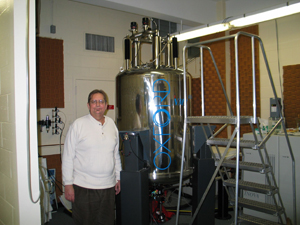|
Core facilities, sometimes called shared resources, provide sophisticated, expensive technology and expertise that no single lab would have the financial resources to purchase and learn. These fee-for-service resources help investigators maximize productivity by providing access to technologies, services and scientific consultation at a reasonable cost. Core facilities also provide stability, reliability, cost-effectiveness and quality control that would be difficult to achieve otherwise.
Facility name: Nuclear Magnetic Resonance (NMR) Core Facility.
Location: Eppley Science Hall, Rooms 1009, 1010 and 1011
Services offered: Structural analysis of small and large molecules of biological and medicinal importance; three-dimensional structural determination; protein-ligand interactions; structure-based drug molecule discovery; small molecule library based drug discovery; tissue analysis. The last two are currently under development.
 |
Ed Ezell, manager of the Nuclear Magnetic Resonance Core Facility, in front of the facility’s 600-MHz NMR instrument. |
- 400MHz Bruker NMR spectrometer (newly installed in December 2007);
- 500-MHz (installed in 1992 and upgraded in 2002) and 600-MHz (installed in 2002) Varian NMR instruments; and
- A cold probe was added to the 600-MHz NMR in 2004.
Testimonials: NMR is an invaluable analytical tool in understanding the structural basis of human diseases such as cancer. The facility provides critical services to basic research funded by the state and federal agencies. NMR also is important in drug discovery. Potential drug lead compounds can be discovered based on three-dimensional structures of proteins or by screening a small molecule library. The current 600-MHz NMR is dedicated to structural determination of proteins and their complexes. We are pursuing additional funding to establish the library screening capability on the newly installed 400-MHz NMR instrument. To illustrate, because of drug-resistance problem, Guangshun Wang, Ph.D., director of the NMR lab, is particularly interested in natural antimicrobial peptides, which show biological activity against bacteria, viruses, fungi and cancer cells. More than 780 such peptides are collected in the current version of the antimicrobial peptide database. We have filed a patent for a minimal antimicrobial and anticancer peptide identified in human LL-37 by NMR. The potential use of this peptide template in engineering novel antibacterial and anti-HIV drugs.
Manager contact information: For more information about the NMR facility, contact Edward Ezell at 559-4174 or eezell@unmc.edu.